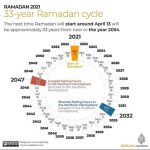Unlock The Magic With Ramadan Pattern: Elevate Your Style And Spirit!
Ramadan Pattern: A Guide to the Holy Month of Fasting
Introduction
Dear Ramadhan enthusiasts, welcome to our comprehensive guide on the Ramadan pattern. This article aims to provide you with all the essential information about this holy month of fasting. As believers around the world observe Ramadan, it is important to have a deeper understanding of its significance, rituals, and benefits. Join us as we explore the rich traditions and practices that make up the Ramadan pattern.
1 Picture Gallery: Unlock The Magic With Ramadan Pattern: Elevate Your Style And Spirit!

What is Ramadan Pattern? 🌙
The Ramadan pattern refers to the religious and cultural practices observed during the holy month of Ramadan. This pattern encompasses various aspects, including fasting, prayer, self-reflection, and acts of charity. Muslims around the world follow this pattern to strengthen their faith, seek forgiveness, and deepen their connection with Allah.
Who Observes Ramadan Pattern? 🕌

Image Source: freepik.com
The Ramadan pattern is observed by Muslims worldwide, regardless of their nationality or cultural background. It is an integral part of Islamic faith and is followed by millions of individuals who identify as Muslims.
When Does Ramadan Occur? 📆
Ramadan is based on the lunar calendar and changes each year. It is the ninth month of the Islamic calendar and lasts for 29 or 30 days, depending on the sighting of the moon. The exact dates of Ramadan vary annually, as it is determined by the lunar cycle.
Where is Ramadan Celebrated? 🌍
Ramadan is celebrated by Muslims worldwide, in every corner of the globe. From bustling cities to remote villages, believers come together to observe this sacred month. The spirit of Ramadan knows no boundaries and unites Muslims across different cultures, languages, and geographies.
Why is Ramadan Important? 🙏
Ramadan holds immense significance for Muslims. It is a time of spiritual reflection, self-discipline, and increased devotion. Fasting during Ramadan is one of the Five Pillars of Islam and is obligatory for adult Muslims, with exceptions for those who are ill, pregnant, nursing, traveling, or menstruating. By abstaining from food, drink, and other worldly desires from dawn to sunset, believers aim to purify their souls and draw closer to Allah.
How is Ramadan Celebrated? 🌙
Ramadan is celebrated through various rituals and practices. The typical day during Ramadan starts with Suhoor, a pre-dawn meal before the Fajr prayer. Throughout the day, Muslims abstain from food, drink, smoking, and intimate relations. The fast is broken at sunset with the evening prayer, known as Maghrib, followed by Iftar, the meal that breaks the fast. Muslims also engage in increased prayer, recitation of the Quran, acts of charity, and engaging in good deeds.
Advantages and Disadvantages of Ramadan Pattern
Advantages:
Enhanced self-discipline and willpower: Fasting during Ramadan helps individuals develop self-control and strengthens their ability to resist temptations.
Spiritual growth: The Ramadan pattern provides an opportunity for believers to focus on their spiritual well-being, fostering a deeper connection with Allah.
Physical and mental detoxification: Fasting promotes detoxification of the body and mind, allowing individuals to cleanse themselves from impurities.
Increased empathy and compassion: The act of fasting fosters empathy and compassion towards those less fortunate, encouraging acts of charity and generosity.
Community bonding: Ramadan brings communities together as individuals gather for Iftar meals, Taraweeh prayers, and engage in charitable activities.
Disadvantages:
Physical challenges: Fasting for long hours can be physically demanding, leading to fatigue and dehydration if proper care is not taken.
Adjustment difficulties: Adapting to the altered eating and sleeping patterns during Ramadan may pose initial challenges for some individuals.
Productivity fluctuations: The change in routine and reduced energy levels may affect productivity levels in some individuals.
Health concerns: Individuals with certain medical conditions may need to consult their healthcare providers before fasting to ensure their well-being.
Social pressures: Non-Muslim friends, colleagues, or family members may not fully understand the significance of Ramadan, leading to potential social challenges.
Frequently Asked Questions (FAQs)
Q: Can pregnant women fast during Ramadan?
A: Pregnant women are exempt from fasting during Ramadan. It is important for them to prioritize their health and consult their healthcare providers regarding their specific situation.
Q: Is it permissible to brush teeth while fasting?
A: Yes, it is permissible to brush teeth while fasting. However, one should avoid swallowing toothpaste or any other substances.
Q: Are children required to fast during Ramadan?
A: Children are not obligated to fast until they reach puberty. However, many children gradually begin to observe fasting as a means of preparation and learning.
Q: Can individuals with chronic illnesses fast during Ramadan?
A: Individuals with chronic illnesses should consult their healthcare providers to determine if fasting is suitable for their condition. It is important to prioritize one’s health and well-being.
Q: How can one make the most of Ramadan?
A: To make the most of Ramadan, one can focus on self-reflection, increased worship, acts of charity, and strengthening family and community bonds. Setting personal goals and seeking knowledge are also beneficial.
Conclusion
In conclusion, the Ramadan pattern is a sacred and cherished time for Muslims around the world. It is a month of self-discipline, increased devotion, and acts of kindness. By understanding the significance, rituals, and benefits of Ramadan, we can fully embrace this holy month and strive for spiritual growth. Let us make the most of Ramadan by fostering empathy, practicing self-restraint, and seeking the blessings of Allah.
Final Remarks
Disclaimer: This article is intended for informational purposes only and should not be considered as a substitute for professional medical or religious advice. It is important to consult with qualified individuals or institutions regarding specific circumstances related to fasting during Ramadan or any other religious practices.
This post topic: Ramadhan


